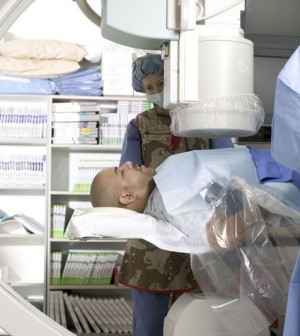- Could Your Grocery Store Meat Be Causing Recurring UTIs?
- Are You Making This Expensive Thermostat Error This Winter?
- Recognizing the Signs of Hypothyroidism
- 10 Strategies to Overcome Insomnia
- Could Artificial Sweeteners Be Aging the Brain Faster?
- Techniques for Soothing Your Nervous System
- Does the Water in Your House Smell Funny? Here’s Why
- Can a Daily Dose of Apple Cider Vinegar Actually Aid Weight Loss?
- 6 Health Beverages That Can Actually Spike Your Blood Sugar
- Treatment Options for Social Anxiety Disorder
Head and Neck Cancers May Be Linked to Hepatitis C

Hepatitis C may increase the risk for certain types of head and neck cancers, researchers say.
Hepatitis C is a serious liver infection caused by a virus. It’s the most common bloodborne infection in the United States, affecting as many as 3.5 million people, according to the U.S. Centers for Disease Control and Prevention. Many are unaware they have the infection.
“What we are trying to make all understand is that this is an infection that has consequences — and it’s an infection we can cure,” said study leader Dr. Harrys Torres, an associate professor of infectious diseases at the University of Texas MD Anderson Cancer Center.
It’s already known that people with hepatitis C have a significantly higher risk of liver cancers and non-Hodgkin’s lymphoma, according to the researchers.
Antiviral drugs cure more than 90 percent of hepatitis C cases, and screening and treatment could prevent cancer from developing, Torres said in a center news release.
He and his colleagues analyzed data from more than 34,500 patients tested at the medical center. The researchers found that those with hepatitis C seemed to have more than twice the risk for cancers in the mouth and throat and a nearly fivefold higher risk for larynx cancers than those without hepatitis C.
The researchers also found that head and neck cancer patients with hepatitis C were more likely to have human papillomavirus (HPV), which is linked with a number of cancers.
The study, published April 13 in the Journal of the National Cancer Institute, could prove important in the screening of hepatitis C patients and the treatment of those with head and neck cancers, the authors said.
Hepatitis C can also affect how cancer patients respond to treatment, Torres added. Doctors need to understand that hepatitis C affects not only the liver, but is a bodywide infection, he said.
More information
The American Academy of Family Physicians has more on hepatitis C.
Source: HealthDay
Copyright © 2026 HealthDay. All rights reserved.










